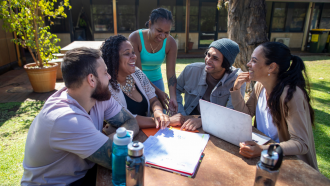-
A lightweight fish pen to move farms to deeper seas
Journal of Marine Science and Engineering
The University of Queensland has co-led a project to design a cost effective yet robust pen to expand fish farming into deeper ocean areas to help feed the growing global population. The University of Queensland has co-led a project to design a cost Read more about A lightweight fish pen to move farms to deeper seas
Australia; QLD; TASThe University of Queensland|Griffith University|University of Tasmania -
EXPERT REACTION: Junk food linked to over 30 physical, mental health and sleep problems
The BMJ
Eating more junk foods such as soft drinks, packaged snacks and sugary cereals is associated with a higher risk of over 30 different health problems both physical and mental, according to an umbrella review by Australian and international researchers Read more about EXPERT REACTION: Junk food linked to over 30 physical, mental health and sleep problems
Australia; International; NSW; VIC; QLD; SADeakin University|Monash University|The University of Sydney... -
New online platform to improve disaster preparedness using community-sourced data, resource mapping and AI
A new online platform aims to better prepare communities for disasters with the use of community sourced data, resource mapping and artificial intelligence (AI) tools. The report Towards Resilient Communities released today, provides details on the Read more about New online platform to improve disaster preparedness using community-sourced data, resource mapping and AI
Australia; VIC; QLDARC Centre of Excellence for Automated Decision-Making and Society... -
Man's best friend might be carrying antimicrobial-resistant bacteria
PLOS ONE
Man's best friend might be carrying antimicrobial-resistant bacteria, according to international researchers who tested E. coli found in the poo of pet dogs. They found evidence that the bacteria had developed some forms of antimicrobial resistance. Read more about Man's best friend might be carrying antimicrobial-resistant bacteria
InternationalSichuan Agricultural University, China -
Chimps and gorillas will experience more frequent extreme climate events in the next 30 years
PLOS ONE
African great apes, including gorillas and chimpanzees, are going to experience extreme events such as wildfires, heatwaves and flooding more frequently in the next 30 years, according to international researchers. The team used past temperature and Read more about Chimps and gorillas will experience more frequent extreme climate events in the next 30 years
InternationalHaramaya University, Ethiopia -
Climate change could affect wine's microbial make-up
PLOS ONE
Climate change could impact the microbial make-up of wine, according to New Zealand researchers. Wine scientists from Lincoln University analysed the bacteria and fungi present during the fermentation of two organic Pinot noir batches from the same Read more about Climate change could affect wine's microbial make-up
New ZealandLincoln University|Manaaki Whenua - Landcare Research -
Radio waves can tune up bacteria to become life-saving medicines
Nano Letters
Scientists from Australia and the United States have found a new way to alter the DNA of bacterial cells – a process used to make many vital medicines including insulin – more efficiently than standard industry techniques, by using radio waves. Read more about Radio waves can tune up bacteria to become life-saving medicines
Australia; NSW; VICRMIT University|University of Wollongong|Swinburne University of Technology... -
High temperatures may immediately increase your risk of having a stroke
JAMA Network Open
A large study has shown that high temperatures, over about 33 degrees, immediately increase your risk of having an ischemic stroke. The Chinese study found that compared to temperatures of around 12 degrees, at 33 degrees there was an increased risk Read more about High temperatures may immediately increase your risk of having a stroke
InternationalFudan University, China -
Silencing a gene could lead to lowering our cholesterol
Nature
Italian researchers say they have been able to repress a gene that has a role in controlling cholesterol levels in mice, and they say they have been able to do this without permanently altering the genetics of the mice. As opposed to directly Read more about Silencing a gene could lead to lowering our cholesterol
InternationalIRCCS San Raffaele Scientific Institute, Milan, Italy -
More than one glass of soft drink a day could increase your risk of kidney disease
JAMA Network Open
Drinking more than one glass a day of sugar-sweetened drinks, or artificially sweetened drinks per day could increase your risk of developing chronic kidney disease, according to an international study of over 120,000 people. The study found people Read more about More than one glass of soft drink a day could increase your risk of kidney disease
InternationalYonsei University, South Korea










































